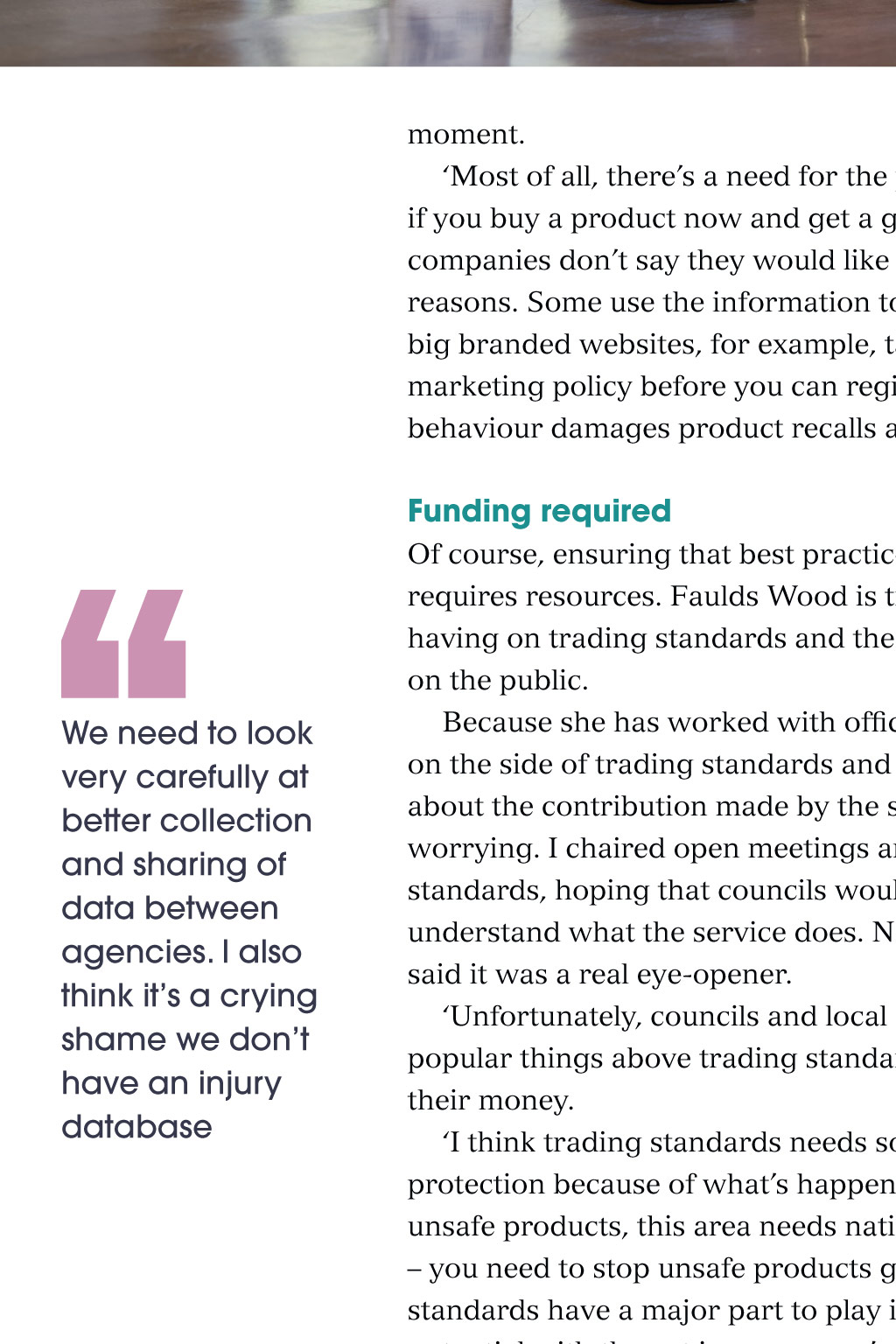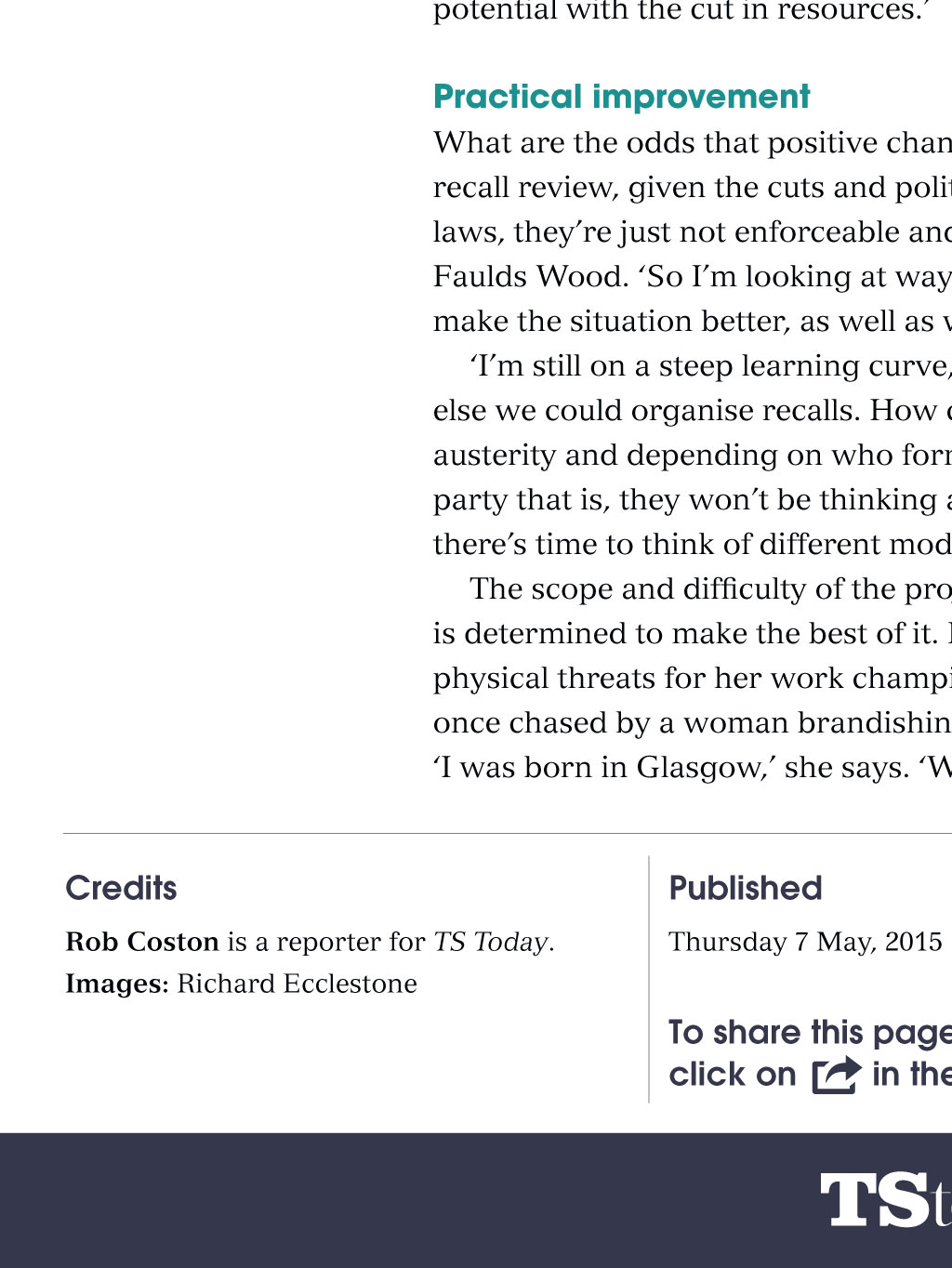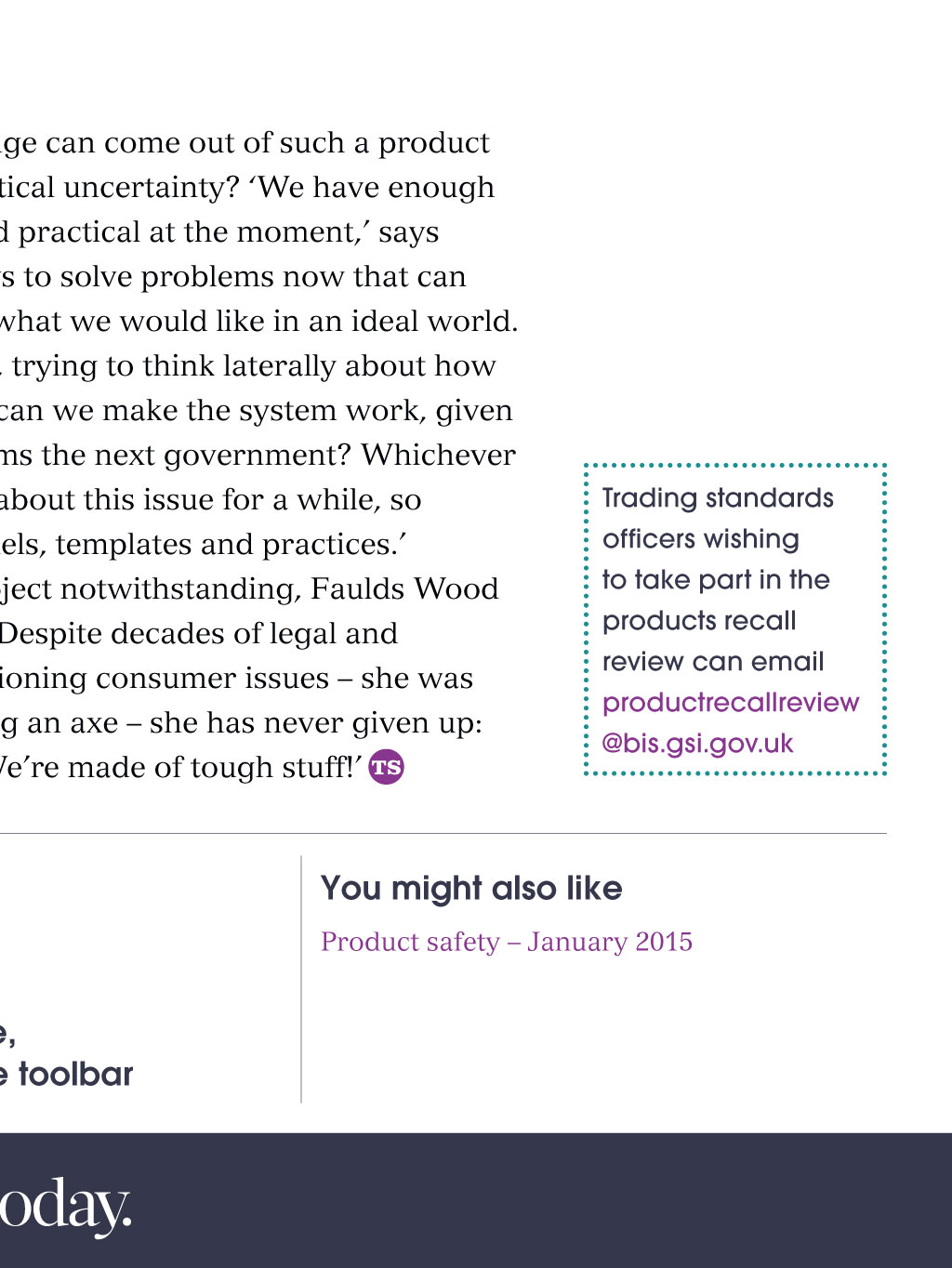




























Interview In this feature product recalls new review reform suggestions Return concern Lynn Faulds Wood has spent her entire career fighting to protect the public. She tells Rob Coston about her latest project heading up a major review into product recalls W hen then Consumer Minister Jo Swinson offered Lynn Faulds Wood the chance to lead a review into product recalls before the General Election, her rst reaction was: This isnt what I do! However, her commitment to consumer journalism actually made her a natural choice. She can trace more than 10m in recalls that have occurred because of her work as a journalist, columnist and television presenter working on the likes of TV-ams Good Morning Britain, BBC Breakfast, Watchdog, GMTV, The Sun and the Daily Mail. My father was a chartered accountant the only poor one working for a charity, she explains. So Ive grown up in a charitable background. After going to Glasgow University, I came down to London intending to become a journalist. My husband then boyfriend [John Stapleton, later her co-presenter on Watchdog] bought me some clothes for Christmas that didnt t, but the shop wouldnt take them back. I got upset, looked up my rights, and it turned out the shop was correct! I went back and persuaded them to change their minds, but that was the start of a long love affair with consumer rights. Faulds Wood can reel off examples of product recalls she has been involved with at the drop of a hat from faulty cars to ammable toasters and deadly cots. Its a certainty that she has helped to save many lives by ensuring that these items were removed from shop shelves. She is also clear that this isnt about hurting business, but about a belief that recalls help industries to improve, and can offer companies a way to get some good PR. Her most recent foray into television took place in 2014, when she co-presented a daytime series called Watchdog Test House, informing the public on issues related to the safety of household goods. She decided not to sign up for the second series though. I felt it wasnt ambitious enough. They wanted something more reective than investigative. Not long after, [then Consumer Minister] Jo Swinson rang to ask if I wanted to head the independent review into product recalls. They had announced it to stop rows in the House of Lords about lack of attention paid to potentially dangerous products. In some ways, working on this review feels like the culmination of my whole career. Pressing issues Im looking at ways to solve problems now that can make the situation better, as well as what we would like in an ideal world. How can we make the system work, given austerity and depending on who forms the next government? The independent review that Faulds Wood is chairing will focus both on how enforcement can be made more effective and explore consumer understanding of the recall process. Although it is still in the early stages, Faulds Wood has some clear aims for it: When I met with the Department for Business, Innovation & Skills (BIS) about chairing the review, I agreed only one condition that we would also talk about sharing information. We need to look very carefully at better collection and sharing of data between agencies. I also think its a crying shame we dont have an injury database a central area for collecting data on whos dying or being injured, and the causes because it could save lives. In the past I used hospital data to nd unsafe products [with a view to] changing the designs, especially when plastic was rst being used for a lot of appliances. We also need to look at changes in the way that products are made for us, and traceability. Today, appliances are often built from parts sourced from multiple countries, which means varying levels of regulation can be applied to each component. So when a product is marked as Made in Germany, for example, it is hard to be sure every component meets expected safety standards. CTSI is in favour of bringing back an injuries database, and Faulds Wood also expresses enthusiasm about creating an established measure of success for product recalls, whether that means achieving a 20 per cent return rate on faulty goods, or a 50 per cent return rate. In the past, for example, Faulds Wood has applied pressure on the government about safety standards for products that has resulted in new British Standards (BS) for product safety. She suggests one way to measure success and promote consistency would be to introduce a BS for product recalls: In this country we have traditionally been a leader in establishing standards that eventually become international. I think there could be a standard on recalls. Getting one would be a great start. A BS on interoperability the linking and sharing of data would also be good. As well as a shared database, central oversight of recalls is another ideal to aim for, says Faulds Wood: Theres a need for central control on whats happening, probably by BIS and trading standards. Other countries have Consumer Product Safety Commissions to handle this effectively. This could also lead to the creation of a comprehensive website that explains and lists recalls and unsafe products. That probably has to be sponsored by government; theres a need for the market surveillance authorities to provide a proper resource for informing people, which is just not happening at the moment. Most of all, theres a need for the public to trust whats happening if you buy a product now and get a guarantee/registration card, most companies dont say they would like your name and address for safety reasons. Some use the information to try and sell their products. Some big branded websites, for example, take you straight to ticking their marketing policy before you can register your product. That kind of behaviour damages product recalls and has to change. Funding required We need to look very carefully at better collection and sharing of data between agencies. I also think its a crying shame we dont have an injury database Of course, ensuring that best practice on product recalls is followed requires resources. Faulds Wood is troubled by the impact cuts are having on trading standards and the knock-on effect that this will have on the public. Because she has worked with ofcers for 35 years, she is very much on the side of trading standards and has even tried to raise awareness about the contribution made by the service: I think the cuts are deeply worrying. I chaired open meetings around the country about trading standards, hoping that councils would send people along to better understand what the service does. Not many came, but those that did said it was a real eye-opener. Unfortunately, councils and local authorities tend to put other, more popular things above trading standards when deciding where to spend their money. I think trading standards needs some kind of central government protection because of whats happening. If we are to do more about unsafe products, this area needs national protection. Europe has it right you need to stop unsafe products getting in where you can. Trading standards have a major part to play in that, but they cant full their potential with the cut in resources. Practical improvement What are the odds that positive change can come out of such a product recall review, given the cuts and political uncertainty? We have enough laws, theyre just not enforceable and practical at the moment, says Faulds Wood. So Im looking at ways to solve problems now that can make the situation better, as well as what we would like in an ideal world. Im still on a steep learning curve, trying to think laterally about how else we could organise recalls. How can we make the system work, given austerity and depending on who forms the next government? Whichever party that is, they wont be thinking about this issue for a while, so theres time to think of different models, templates and practices. The scope and difculty of the project notwithstanding, Faulds Wood is determined to make the best of it. Despite decades of legal and physical threats for her work championing consumer issues she was once chased by a woman brandishing an axe she has never given up: I was born in Glasgow, she says. Were made of tough stuff! Trading standards officers wishing to take part in the products recall review can email productrecallreview @bis.gsi.gov.uk Credits Published You might also like Rob Coston is a reporter for TS Today. Thursday 7 May, 2015 Product safety January 2015 Images: Richard Ecclestone To share this page, click on in the toolbar